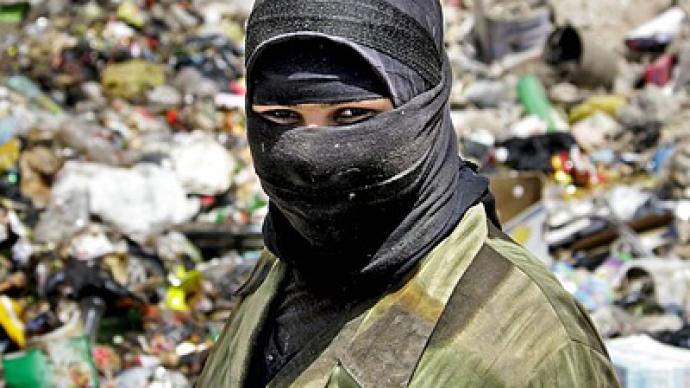US reconstruction effort fails to reach Iraq’s desperately poor

Despite the US pumping billions of dollars into regenerating Iraq, thousands of Iraqis are still living below the poverty line and are skeptical about prospects for improvement.
At 7am every day, Fatma crouches outside her house and along with her sister and cousins and begins to sort through garbage. Displaced from southern Iraq, Fatma’s family is too poor to send her to school and so she works eight hours a day sorting through Baghdad’s landfill, collecting plastic and metal that will be shipped abroad for recycling. Her reward for carting forty pounds of trash around is two dollars and fifty cents.For many, the acres of Baghdad’s trash is just waste, but for local families, this is not only their livelihood, but also their home.Over 2,000 people live on Baghdad’s landfill, Al-Tajiat, making their homes out of the garbage that the rest of the city throws away. There is no running water or electricity and no access to medical treatment. If someone becomes sick they have to be taken to hospital by donkey cart.“Can you believe that an Iraqi would live in a shack made from garbage?” asks Tabar Mutar Hassan Al-Musawi, a local tribal leader. “People hoped for development and change so we could say that Iraq is still a wonderful place, blessed by God. The old regime is gone and we have a new government, but look at our situation. We are living in shacks.”The US is spending $53 billion on the reconstruction effort in Iraq, but the residents of Al-Tajiat have not seen a dime of it. What they have seen, though, is the sectarian violence that drove them from their homes five years ago.“We used to live in Abu-Ghraib,” says Naima Faisal. “Then America came. The war increased in Iraq. People started killing each other and so we fled because we were afraid.”In 2005, Naima’s family moved to the landfill and have been living there ever since, too afraid and too poor to return home. Naima is still unemployed. “The American occupation turned Iraq into a battlefield as well as sewing the seeds of political corruption,” says Faizia al-Obaidiy, an MP. “How can Americans stand back and watch without intervening in this situation? Everybody knows about the failure of the Iraqi economy. It has fallen to 70% if not 90% of what it used to be. This is having a terrible effect on the ground, both socially and economically.”Experts worry about the children who grow up too poor to go to school. Without an education, they are easily preyed on by criminal gangs and terrorist organizations that lure them with money and promises of a brighter future. “How can I fulfill a dream when I live in fear?” asks 19-year-old Mohammed. “I can’t accomplish anything. We want nothing but security and for everyone to go back home, even though there is no work. We only need security. That’s it. We don’t want anything but security.”Iraq remains a very dangerous place where kidnappings and murders are part of daily life. For the Shia families, living on a trash heap is still better than living with Sunni neighbors back home.But, until that is possible and until American reconstruction dollars reach the quarter of Iraq’s population that live in poverty, children like Fatma will continue to collect trash in order to survive.











